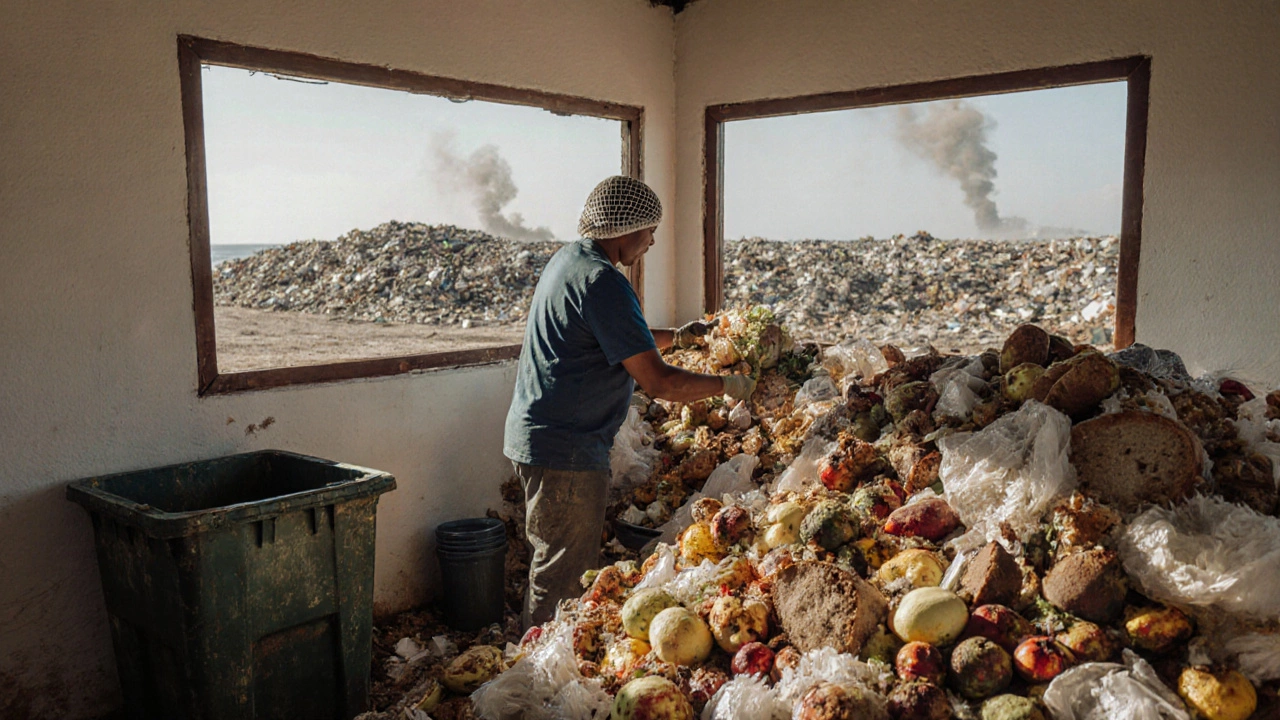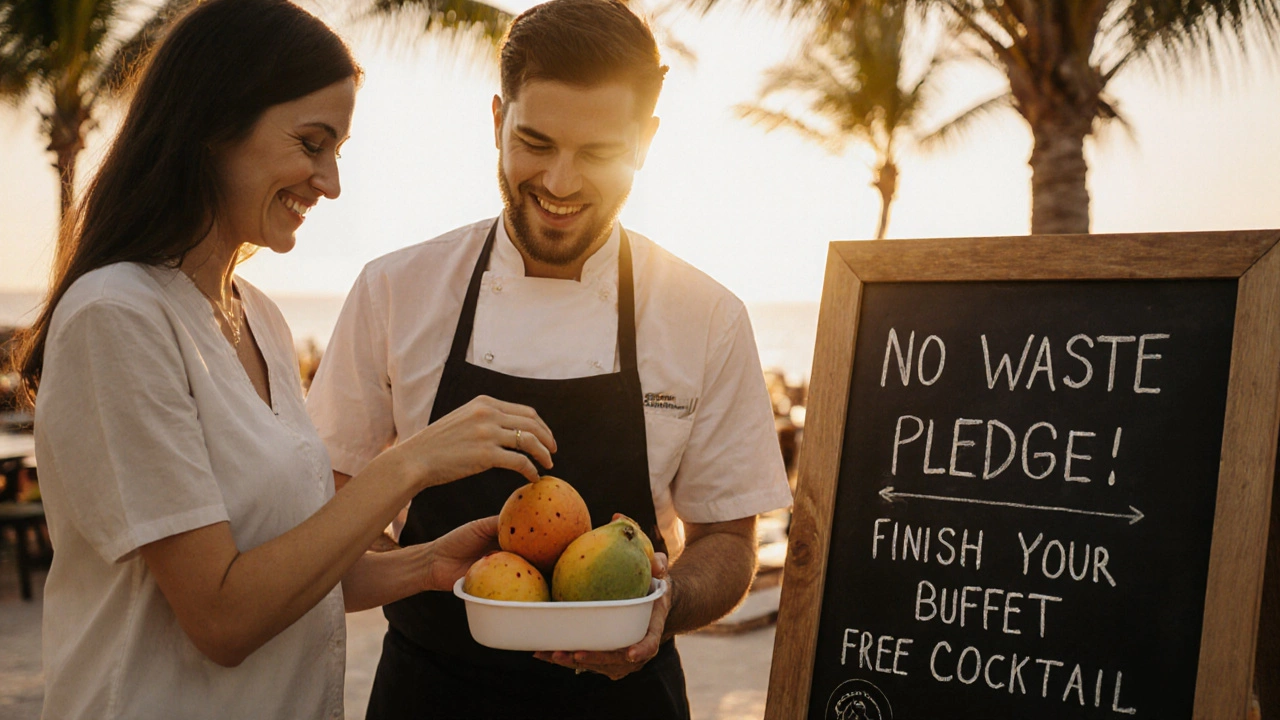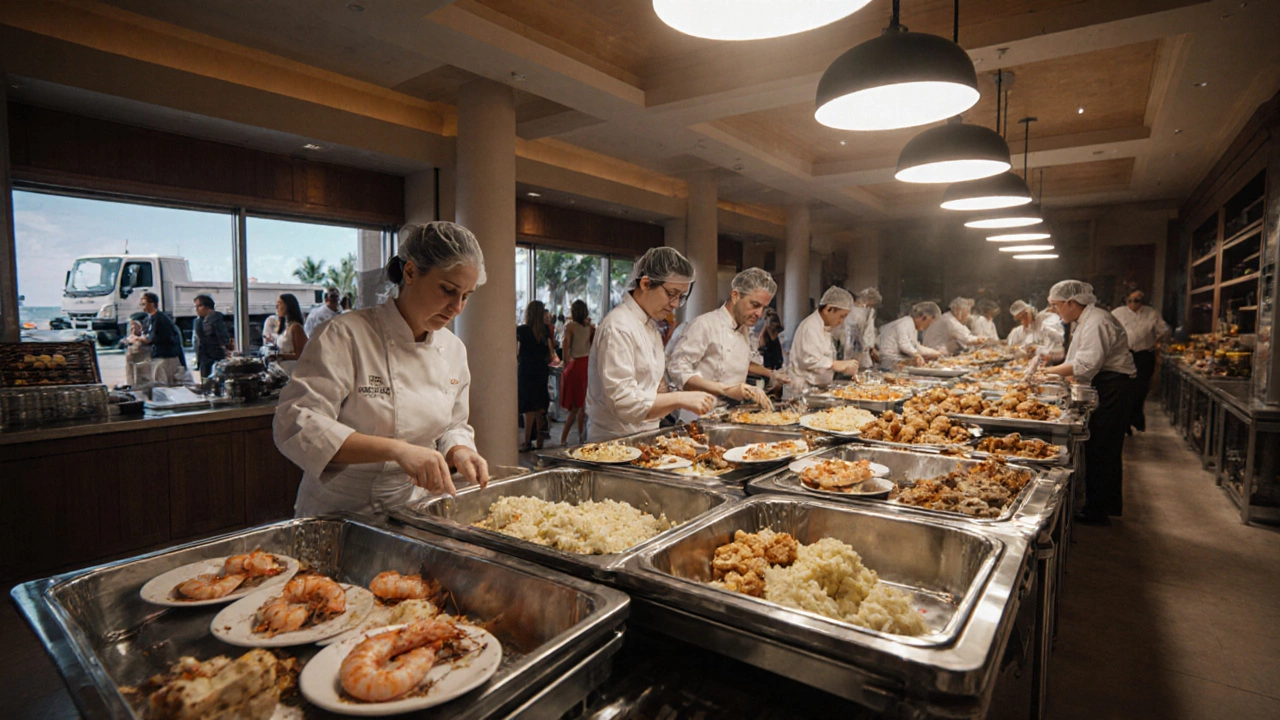Food Waste Calculator
How much food waste are you contributing?
Based on World Tourism Organization data showing all-inclusive resorts generate 1.2 kg of food waste per guest daily
Total food waste: kg
Equivalent to:
How this compares to sustainable resorts:
What you can do:
- Take smaller portions
- Ask about food donation policies
- Use reusable containers for leftovers
- Leave reviews about sustainability
Ever watched the last hour of a massive all-inclusive hotel buffet? Plates piled high with grilled shrimp, mashed potatoes, and untouched pastries get cleared away while the next group of guests walks in. It looks like luxury. But what really happens to all that food? If you’ve ever wondered why the bins behind the kitchen look like a landfill, you’re not alone. The truth is, most all-inclusive resorts throw away a shocking amount of food every single day.
How Much Food Actually Gets Wasted?
According to a 2023 study by the World Tourism Organization, all-inclusive resorts generate an average of 1.2 kilograms of food waste per guest per day. That’s more than double the amount produced by regular hotels. A mid-sized resort with 500 rooms can easily toss out over 600 kilograms of food daily. Imagine 600 kilos of rice, bread, fruit, and meat-enough to feed a small town-going straight into the trash.
Why? Because the business model runs on abundance. Guests expect endless options: breakfast at 7, lunch at 12, dinner at 19, snacks at 22. Staff are trained to keep every station overflowing. If a dish looks even slightly low, it gets refilled-even if half of it was untouched from the last round. The goal isn’t efficiency. It’s the feeling that you can eat as much as you want, whenever you want. And that mindset leads to waste.
Where Does the Food Go?
Most of the leftover food ends up in landfills. In places like Mexico, the Dominican Republic, or Thailand-where many all-inclusive resorts are located-waste management systems aren’t built to handle this kind of volume. Organic waste rots in open pits, releasing methane, a greenhouse gas 25 times more potent than carbon dioxide.
Some resorts claim they compost. But composting isn’t simple. It needs space, trained staff, and strict separation of food from plastics and napkins. Many don’t have the infrastructure. Even when they do, the compost often ends up on resort grounds as fertilizer-not redistributed to local communities.
A few high-end resorts partner with local charities. In Cancún, one resort donates unserved, untouched meals to a shelter run by nuns. But that’s rare. Most food is too risky to donate: no traceable origin, no refrigeration logs, no health department approval for off-site distribution. Legal liability scares most hotels away.
What About the Buffet System?
The buffet is the heart of the all-inclusive experience-and the biggest source of waste. Guests load up plates they can’t finish. Staff refill dishes even when they’re half-empty. Why? Because if a plate looks empty, guests think the resort is running out. And if they think that, they might leave.
Some resorts are starting to change this. In Jamaica, the Sandals chain introduced ‘serve yourself in small portions’ signs and smaller serving dishes. They also added a ‘no waste’ pledge at check-in: guests who finish their meals get a free cocktail. It sounds simple, but it cut food waste by 37% in six months.
Others use smart tech. In the Canary Islands, a resort installed weight sensors under buffet trays. When a tray hits 70% unused, the kitchen gets an alert to stop refilling. It’s not magic-but it’s better than guessing.

Why Don’t All Resorts Do This?
Cost and convenience. Reducing waste means changing systems, training staff, and sometimes losing revenue. If you cut back on food, guests might complain. And complaints mean bad reviews. And bad reviews mean fewer bookings.
Also, food is cheap. In many countries, bulk ingredients cost less than the labor needed to manage waste properly. It’s easier to buy 100 extra lobsters than to track who ate what. The system is built on low margins and high volume. Waste is just a cost of doing business.
But that’s changing. Travelers are asking questions. Social media posts like #AllInclusiveWaste have gone viral. Guests now bring their own containers. They ask: ‘Can you donate this?’ or ‘Do you compost?’ Resorts that ignore these questions risk losing customers.
What Can You Do as a Guest?
You’re not powerless. Here’s what actually works:
- Take smaller portions. You can always go back.
- Don’t pile food on your plate just because it looks good. Eat first, then decide.
- Ask if the hotel donates food. If they say no, politely ask why. Sometimes just asking makes them rethink.
- Use the ‘leftovers’ bins if they exist. Some resorts have them for staff meals.
- Leave a review mentioning food waste. Positive feedback for sustainability matters more than you think.
One guest in Puerto Vallarta started bringing a small reusable container. She asked the kitchen staff if she could take home uneaten fruit. They laughed at first. Then they started saving her mangoes and papayas every night. Now, the resort gives her a free smoothie every morning for ‘being the one who cares.’

The Future of Food in All-Inclusive Resorts
The best resorts are starting to treat food like a resource, not a decoration. Some are shifting to à la carte dining within the all-inclusive model. Others are partnering with local farms to use only what’s in season. A few even let guests pre-order meals the night before-so kitchens cook only what’s needed.
In 2024, the International Hospitality Council launched a ‘Zero Waste Buffet’ certification. Only 12 resorts worldwide have earned it. They track every gram of waste. They train staff to repurpose scraps-peelings become broth, stale bread turns into croutons. They donate what they can. And they report their numbers publicly.
Change is slow. But it’s happening. And it’s being pushed by guests like you.
Is There a Better Way?
Maybe. But the real question isn’t whether resorts can do better. It’s whether we’re willing to redefine what ‘all-inclusive’ means. Is it about endless food? Or is it about thoughtful abundance? The difference matters.
The next time you’re at a resort, look past the buffet line. See the people cleaning up. See the trucks hauling away the waste. See the landfills filling up. Then ask yourself: is this luxury-or just waste dressed up as hospitality?
Do all-inclusive hotels donate leftover food?
Very few do. Most resorts avoid donating due to legal liability, lack of refrigeration tracking, and health regulations. A small number in Mexico, Costa Rica, and the Caribbean partner with local shelters, but it’s not common. Always ask-some staff may be willing to help if you’re respectful and persistent.
Is food waste in all-inclusive hotels illegal?
No, it’s not illegal in most countries. But some places are starting to pass laws. In Spain and France, large food businesses must donate unsold food. In tourist-heavy areas like Bali and the Dominican Republic, local governments are pushing resorts to reduce waste-but enforcement is weak. Right now, it’s voluntary.
Can I take leftover food from the buffet?
Technically, no. Buffet food is meant to be eaten on-site. But some staff quietly allow guests to take small portions of fruit or bread if you ask politely. Never sneak food-it creates tension. Instead, ask the manager if there’s a ‘guest take-home’ policy. Some resorts have one.
Do all-inclusive hotels compost their food waste?
A few do, but most don’t. Composting requires space, equipment, and trained staff. It also needs food to be separated from plastic, napkins, and cutlery-which is hard when guests mix everything. Resorts in eco-conscious areas like Costa Rica or the Maldives are more likely to compost. Elsewhere, it’s usually cheaper to just dump it.
How can I tell if a resort is serious about reducing food waste?
Look for signs: smaller serving dishes, ‘take only what you’ll eat’ signage, staff asking if you want seconds, or menus based on daily harvests. Check their website for sustainability reports. Resorts that publish food waste numbers or partner with NGOs are more likely to be genuine. If they only say ‘we care about the environment’ without details, they’re probably just greenwashing.
